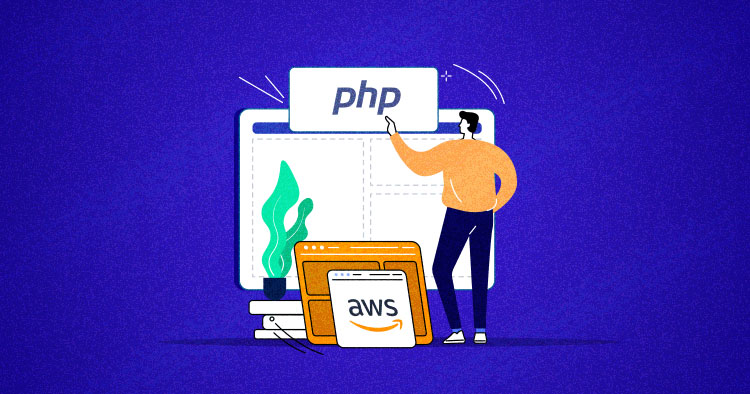
Are you a PHP developer looking to take your application to the next level?? Hosting your application on the cloud server can provide several benefits, including scalability, reliability, and cost-effectiveness.
Amazon Web Services (AWS) is a leading cloud platform that can help you achieve your goals. With its wide range of services and tools, AWS makes setting up, managing, and scaling your PHP application easy.
In this article, I’ll guide you through the process of hosting your PHP application on AWS: from setting up an EC2 instance to configuring your application for optimal performance.
Discover the perfect synergy of AWS infrastructure and Cloudways’
Harness the scalability and reliability of AWS infrastructure combined with the simplicity and efficiency of Cloudways’ managed hosting platform.
Choosing the Right AWS Services
Amazon Web Services (AWS) offers a wide range of services and tools for businesses and developers. Choosing the right services for your specific needs can be challenging with so many available options. Here are some tips to help you make the right choice:
| Factor | Description |
| Requirements | Identify your specific needs and requirements for using AWS. |
| Available Services | Research the different AWS services that are available and their capabilities. |
| Cost and Scalability | Choose services that fit within your budget and can scale with your business. |
| Expert Advice | Consider seeking advice from an AWS expert or consultant to help you choose the right services. |
Reasons to Choose AWS EC2 for PHP
Amazon Elastic Compute (EC2) is the core component of Amazon Web Services. It allows users to rent virtual computers to run web applications as a virtual private server. These virtual private servers are almost similar in functionality to dedicated physical servers.
AWS Flexible Beanstalk for PHP makes it simple to deploy, manage, and scale your PHP web applications utilizing Amazon Web Administrations. Elastic Beanstalk for PHP is accessible to anybody developing or hosting a web application using PHP.
Here are a few main reasons for deploying PHP applications on Amazon EC2, highlighting the fact as to why businesses are rapidly moving towards Amazon’s virtual server hosting platform:
1. Complete Control

– Source: Amazon
Users have complete administrative control over their virtual servers (also known as compute instances) by hosting a website on AWS EC2. Essentially, PHP, MySQL, and AWS hosting provide the same level of access and control as a physical server operated locally in the office.
Users can efficiently manage many web features through the Amazon EC2 web interface, which allows users to scale up or down, boot, and configure processor settings with just a few clicks.
2. Platform Freedom

– Source: Amazon
When you launch an application on an EC2 instance, you get the authority to run an operating system of your choice. Users can select from multiple Linux distributions or run the Microsoft Windows server.
This is an important feature for most businesses, especially those considering switching to the cloud. Suppose a company has used Windows Server for years and has developed apps and databases within the Windows Server framework.
In that case, they shouldn’t have to reprogram their IT infrastructure in the cloud to run on a different platform. As users can select the operating system of their choice, migrating your website to the EC2 platform is quite easy.
3. Advanced Security

– Source: Amazon
EC2 has multiple built-in security features. When you launch an application on EC2, its deployment is on a technically isolated virtual private cloud network. Users have complete control to authorize who wants to access their apps on the cloud.
Amazon EC2 has security groups that act as virtual firewalls to control traffic to one or multiple applications. Users can establish rules for each security group and modify them anytime.
If a company decides to keep some processes running on-premise and they want to connect its virtual private clouds to physical hardware on-site, it can establish a seamless connection through a hardware VPN device.
4. Service Availability

– Source: Amazon
Reliability and availability are key attributes of Amazon Web Services (AWS), making it a popular choice for hosting websites and applications. AWS has designed its infrastructure with a strong focus on ensuring high availability and minimizing downtime. One of the primary factors contributing to AWS’s reliability is its global presence. AWS operates worldwide, each consisting of several availability zones. Availability zones are physically separate data centers within a region, designed to be independent of one another.
To monitor and maintain high availability, AWS provides extensive monitoring and alerting capabilities through services like AWS CloudWatch. You can track performance metrics, set alarms, and receive notifications in case of any anomalies or thresholds being breached.
5. Auto-scalability

– Source: Amazon
AWS provides horizontal and vertical scalability options, horizontal scaling allows you to easily add or remove resources based on traffic fluctuations. Whereas vertical scalability allows you to adjust the capacity and performance of your underlying infrastructure as your application grows.
Furthermore, AWS offers serverless computing with services like AWS Lambda. With serverless architecture, your application automatically scales based on incoming requests, ensuring resources are allocated as needed and reducing operational overhead.
AWS scales your website or application seamlessly and efficiently. Whether you need to handle sudden traffic spikes, accommodate increasing data storage requirements, or adopt a serverless approach, AWS meets your evolving needs.
Requirements of AWS SDK for PHP
To use the AWS SDK for PHP, you must use PHP version 5.5.0 or later with the SimpleXML PHP extension enabled. If you need to sign private Amazon CloudFront URLs, you also need the OpenSSL PHP extension.
Upgrade to Cloudways Hosting for Seamless PHP Hosting on AWS
Our powerful servers are optimized to meet the system requirements of the AWS server, guaranteeing a smooth experience for your PHP apps.
How to Install PHP Apps on Amazon EC2
PHP is flexible and easy to use, with tools for managing dependencies and working with databases. While not all cloud hosting providers offer great performance for PHP applications, AWS is popular among experienced PHP developers.
For those who want to quickly deploy a PHP application without worrying about technical details, a managed PHP hosting provider like Cloudways can be a great solution. It saves time and resources, allowing developers to focus on building great web apps.
To set up a server directly on PHP with MySQL, AWS hosting requires a decent bit of server-side technical knowledge. Therefore in this article, I will demonstrate how easy it is to install PHP on AWS EC2 using Cloudways.
Step 1: Launch Server
Step 2: Select PHP and AWS EC2
- Select PHP → Custom App from the drop-down menu;

- Choose AWS Server as a cloud infrastructure.

💡 Note: Cloudways support PHP 7.4 or higher.
Step 3: Select Server Size, Bandwidth, Storage
It’s time to choose the resources for your server. Use the slider to pick the server size, bandwidth, and storage you need.

3.1. Bandwidth

3.2. Database

Step 4: Select Server Location
Choose the location where you want your server to be. Then, click ‘Launch Server’ to set up PHP on your AWS EC2 server.

Step 5: Launch Your Server

Why Should You Consider Cloudways for PHP Apps
Cloudways offers a compelling solution for PHP applications, providing a seamless and efficient cloud hosting platform, here are four reasons to consider Cloudways for your PHP applications:
1. Managed Cloud Hosting
Cloudways offers managed cloud hosting services, which means they take care of server management tasks such as security updates, server monitoring, and backups. This allows developers to focus more on developing their PHP applications rather than worrying about server maintenance.
Users can launch servers, manage databases, configure caching mechanisms, and more with just a few clicks. Cloudways streamlines the process by automating server setup and deployment, saving valuable time and effort.
2. Performance
To facilitate you further, Cloudways enables you to monitor 15+ important server metrics in graphical form, to ensure you are always aware of how your server is performing. You will also get a free New Relic account for advanced metrics monitoring.

Cloudways ensures optimal performance for PHP applications on AWS. Through its advanced caching technologies like Varnish, Redis, and Memcached, Cloudways significantly enhances website speed and reduces server response time.
With the ability to scale server resources vertically and horizontally in real time, Cloudways allows PHP applications to handle sudden spikes in traffic without compromising performance.
3. Security
Cloudways also provides fool-proof security to its deployed web applications, with identity management, SSL certificates, data redundancy, automated backups on AWS S3, and many other similar features.
4. Optimized for PHP
Cloudways provides optimized hosting environments specifically designed for PHP applications. Cloudways uses AWS’s powerful infrastructure to deliver optimized performance for PHP applications. With features like server-level caching such as Redis cache, built-in Content Delivery Network (CDN) integration, and advanced caching mechanisms, Cloudways ensures that PHP apps hosted on AWS achieve high-speed performance and low latency, resulting in an excellent user experience.
5. Simplified AWS Management
Cloudways simplifies the complexity of AWS by providing a user-friendly management interface. Instead of using intricate AWS’s console and complex configurations, Cloudways abstracts these complexities into a streamlined dashboard. This makes it easier for developers to deploy, manage, and scale their PHP applications on AWS without needing extensive expertise in cloud infrastructure management.
Performance Optimization Techniques
There are several techniques to optimize the performance of PHP on AWS. Let’s know what they are!
1. Caching
Implementing caching mechanisms like HTTP, opcode, and query caching can significantly improve performance by reducing the need to fetch or process data repeatedly. Implement a caching layer, such as Redis or Memcached, to store frequently accessed data in memory. This reduces the need to query the database for every request and improves response times.
2. Database Optimization
Optimize your database queries using appropriate indexes, avoiding unnecessary joins or subqueries, and optimizing table structures. Additionally, consider implementing database connection pooling to reduce overhead.
3. Minification and Compression
Minify your CSS and JavaScript files to remove unnecessary characters, spaces, and comments. Compress your static assets using gzip or similar algorithms to reduce their size, resulting in faster downloads.
4. Asynchronous Processing
Utilize asynchronous processing for time-consuming tasks such as file uploads or external API calls. This allows your application to handle multiple requests concurrently and prevents blocking the execution flow.
5. Optimize Autoloading
Take advantage of class autoloading mechanisms provided by Symphony. Configure the autoloader to load classes only when they are actually needed, reducing the overhead of loading unnecessary classes.
6. Content Delivery Network (CDN)
Implement a CDN to distribute static assets across multiple worldwide servers, such as images, CSS, and JavaScript files. This reduces latency and improves the overall performance by serving files from a location closer to the user.
7. Optimized Server Configuration
Fine-tune your server configuration, such as PHP settings, web server settings (e.g., Apache or NGINX), and database configuration, to suit the requirements of your application. Adjusting memory limits, timeouts, and connection pool sizes can significantly impact performance.
Host PHP Websites with Ease [Starts at $11 Credit]
- Free Staging
- Free backup
- PHP 8.3
- Unlimited Websites

Conclusion
So, this comes to the end of this article, in which I have demonstrated in detail how to host a PHP on an Amazon EC2 server. Cloudways gives ready-made solutions to install PHP on AWS EC2, and the steps are rightly defined above.
Still, want to know more about Cloudways? Have a look at more features, or you can always ask our 24/7 support team to guide you. Better yet, experience the console yourself and Start your free trial on the Cloudways by launching PHP 8.3 on the AWS EC2 server.
Q: Which PHP framework is supported on AWS?
A: You can host Laravel, CodeIgniter, CakePHP, Symfony, and many other PHP frameworks on AWS Cloud servers. All of these frameworks are quite advanced and provide optimized features to be deployed with PHP 8.3 AWS EC2 servers.
Q: How many CMS platforms are supported on AWS?
A: All the major CMS solutions, including WordPress, Drupal, Magento, Joomla, Moodle, and others, are supported on AWS. The platform provides easy and quick installation of these CMSs on its servers, providing better Cloud infrastructure to build applications.
Q: Which tools can I use to deploy PHP on AWS with Cloudways?
A: Using Cloudways, you can either deploy PHP apps on AWS via a manual process or could use some deployment tools like Envoyer, DeployBot, and others. These tools are supported on Cloudways, helping you deploy your AWS apps with zero downtime. Moreover, Cloudways also provides a pre-built GitHub deployment tool that allows developers to deploy their projects from GitHub in minutes.
Q: How to upgrade PHP 8.3 on AWS hosting with Cloudways?
A: You can easily migrate PHP version on Cloudways by selecting the desired PHP version from the Settings and Packages tab. By default, all Cloudways servers come preconfigured with PHP 7.4. However, you can upgrade to the latest PHP 8.3 or any other version from the Settings and Packages tab.
Q: Can I use PHP in AWS?
A: Yes, you can use PHP on AWS through Cloudways. Cloudways offers a managed hosting platform that leverages AWS infrastructure, allowing users to deploy and manage PHP applications seamlessly on AWS servers.
Q: Does Amazon use PHP?
A: Yes, Amazon uses PHP in various capacities. However, the primary language choices within Amazon’s infrastructure are diverse, with PHP being just one component of their technology stack.
Shahzeb Ahmed
Shahzeb is a Digital Marketer with a Software Engineering background, works as a Community Manager — PHP Community at Cloudways. He is growth ambitious and aims to learn & share information about PHP & Laravel Development through practice and experimentation. He loves to travel and explore new ideas whenever he finds time. Get in touch with him at [email protected]


